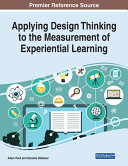Download Applying Design Thinking to the Measurement of Experiential Learning PDF Free - Full Version
Download Applying Design Thinking to the Measurement of Experiential Learning by Adam Peck, Danielle Desawal in PDF format completely FREE. No registration required, no payment needed. Get instant access to this valuable resource on PDFdrive.to!
About Applying Design Thinking to the Measurement of Experiential Learning
<span>In the field of student affairs, many are rethinking the value of a wide variety of traditional aspects associated with the student experience. Recent commentary has questioned whether students should attend college that has an all-inclusive tuition, focused primarily upon academic and support services. Given the need for changes the COVID-19 pandemic has created, it is imperative to question whether this kind of academic package is ideal for the future of higher education. As issues surrounding the traditional aspects of the student experience continue to develop, research has begun to focus on how student learning and awareness can be improved, specifically within the principles of design thinking. Applying Design Thinking to the Measurement of Experiential Learning is a forward-thinking and innovative look at assessment and design conditions that promote student learning. It proposes new models for education, conditions for student learning, and student learning assessment using design thinking and experiential learning. These topics include adjustments to curriculum, integrated learning environments, student success and student affairs, campus-wide design thinking, and testing assessments. This book is valuable for senior leaders in the field of student affairs, student affairs assessment professionals and faculty teaching in higher education programs, practitioners, researchers, academicians, and students interested in how the principles of design thinking can be applied to higher education.</span>
Detailed Information
| Author: | Adam Peck, Danielle Desawal |
|---|---|
| Publication Year: | 2021 |
| ISBN: | 1799877698 |
| Pages: | 390 |
| Language: | other |
| File Size: | 7.8978 |
| Format: | |
| Price: | FREE |
Safe & Secure Download - No registration required
Why Choose PDFdrive for Your Free Applying Design Thinking to the Measurement of Experiential Learning Download?
- 100% Free: No hidden fees or subscriptions required for one book every day.
- No Registration: Immediate access is available without creating accounts for one book every day.
- Safe and Secure: Clean downloads without malware or viruses
- Multiple Formats: PDF, MOBI, Mpub,... optimized for all devices
- Educational Resource: Supporting knowledge sharing and learning
Frequently Asked Questions
Is it really free to download Applying Design Thinking to the Measurement of Experiential Learning PDF?
Yes, on https://PDFdrive.to you can download Applying Design Thinking to the Measurement of Experiential Learning by Adam Peck, Danielle Desawal completely free. We don't require any payment, subscription, or registration to access this PDF file. For 3 books every day.
How can I read Applying Design Thinking to the Measurement of Experiential Learning on my mobile device?
After downloading Applying Design Thinking to the Measurement of Experiential Learning PDF, you can open it with any PDF reader app on your phone or tablet. We recommend using Adobe Acrobat Reader, Apple Books, or Google Play Books for the best reading experience.
Is this the full version of Applying Design Thinking to the Measurement of Experiential Learning?
Yes, this is the complete PDF version of Applying Design Thinking to the Measurement of Experiential Learning by Adam Peck, Danielle Desawal. You will be able to read the entire content as in the printed version without missing any pages.
Is it legal to download Applying Design Thinking to the Measurement of Experiential Learning PDF for free?
https://PDFdrive.to provides links to free educational resources available online. We do not store any files on our servers. Please be aware of copyright laws in your country before downloading.
The materials shared are intended for research, educational, and personal use in accordance with fair use principles.

